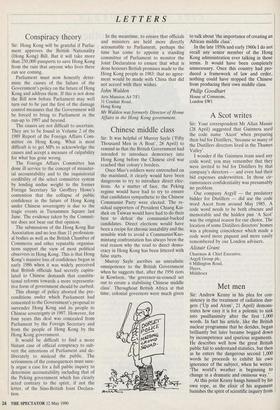Chinese middle class
Sir: It was helpful of Murray Sayle (`Fifty Thousand Men in A Boat', 28 April) to remind us that the British Government had intended to introduce democracy into Hong Kong before the Chinese civil war reached that colony's borders.
Once Mao's soldiers were entrenched on the mainland, it clearly would have been dangerous to try to introduce direct elec- tions. As a matter of face, the Peking regime would have had to try to ensure that candidates sympathetic to the Chinese Communist Party were elected. The re- sidual supporters of President Chiang Kai- shek on Taiwan would have had to do their best to defeat the communist-backed candidates. Direct elections would have been a recipe for chronic instability and the sensible wish to avoid a Communist/Kuo- mintang confrontation has always been the real reason why the road to direct demo- cracy in Hong Kong has been littered with false starts.
Murray Sayle ascribes an unrealistic omnipotence to the British GOvernment when he suggests that, after the 1956 riots in Kowloon, 'the governor-in-council set out to create a stabilising Chinese middle class'. Throughout British Africa at that time, colonial governors were much given to talk about 'the importance of creating an African middle class'.
In the late 1950s and early 1960s I do not recall any senior member of the Hong Kong administration ever talking in those terms. It would have been completely unnecessary. Once this country had pro- duced a framework of law and order, nothing could have stopped the Chinese from producing their own middle class.
Philip Goodhart
House of Commons, London SW1




























































 Previous page
Previous page